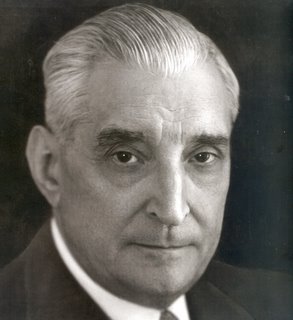- 08 Mar 2015 13:07
#14534088
Imagine a country led by religious clergy elected by the people. The parliament of the country would consist of clergymen of various faiths.
There would be two levels of parliamentary government, and they would interact with each other more or less the same way the senate and the congress in the USA do.
The upper level would consist of equal numbers of clerical representatives from the existing religious groups. So if there were 27 registered religious groups in the country, every 27th member would come from the clergy of a particular religious group.
The lower governmental level's representation of the different clergies would be determined by proportionality. So if for instance 20% of the registered religious people of the country were catholics, catholic clergymen would hold 20% of the seats.
There would be separate elections for both levels of government. The registered members of a particular religious group would vote on which people among their clergy would be best suited to govern them, and these clergymen would take the parliamentary seats as they are proportioned at the time the election is held. In order to prevent voting fraud, it might perhaps be illegal to change one's religious group during election time.
All people would be required to register themselves to some religious organisation in order to get voting rights. If the group disapproves of having a clergy (as indeed some religions lack them), it will instead elect from its ranks governmental representatives by some other name, but essentially similiar in function.
In order for a religious group to become registered, there would have to be at least a certain amount (not much) of membership, recognition of the existence of something supernatural, and at least some idea on what the group's teachings are. In order to safeguard the morals of the country, atheists would not be allowed to register themselves as a religious group.
The elected government would mainly make decisions on general matters such as economy and foreign policy, while mostly leaving the morality laws in the hands of the religious groups themselves. The religious groups would therefore have their own separate morality laws, which are legally binding on their membership. For instance, it would be legal for jews to illegalise the eating of kosher foods among their membership, but this ban would not affect the members of some other faith where these foods are allowed. However, it wouldn't be possible to escape the law by changing religious groups: If a person started eating kosher food after leaving Judaism, that would be perfectly legal; but if he did so while being a registered jew and then changed his membership to something else, he could still be prosecuted for violating the hypothetical kosher ban.
There would have to be some limitations though, for example it wouldn't be legal for religious groups to punish people for trying to leave their organisation or to legalise something obscene like human sacrifice. It also wouldn't be possible for them to restrict basic human rights by - for instance - imprisoning their members without charges, preventing them from exercising free speech, or anything like that. Courts should for this purpose be an independent entity from the religious groups, merely obligated to follow the particular group's laws in passing it's judgements. There would also have to be a generalised law decided on by the government for those not registered to any religious group (and parts of it would naturally apply to everone).
Any thoughts?
There would be two levels of parliamentary government, and they would interact with each other more or less the same way the senate and the congress in the USA do.
The upper level would consist of equal numbers of clerical representatives from the existing religious groups. So if there were 27 registered religious groups in the country, every 27th member would come from the clergy of a particular religious group.
The lower governmental level's representation of the different clergies would be determined by proportionality. So if for instance 20% of the registered religious people of the country were catholics, catholic clergymen would hold 20% of the seats.
There would be separate elections for both levels of government. The registered members of a particular religious group would vote on which people among their clergy would be best suited to govern them, and these clergymen would take the parliamentary seats as they are proportioned at the time the election is held. In order to prevent voting fraud, it might perhaps be illegal to change one's religious group during election time.
All people would be required to register themselves to some religious organisation in order to get voting rights. If the group disapproves of having a clergy (as indeed some religions lack them), it will instead elect from its ranks governmental representatives by some other name, but essentially similiar in function.
In order for a religious group to become registered, there would have to be at least a certain amount (not much) of membership, recognition of the existence of something supernatural, and at least some idea on what the group's teachings are. In order to safeguard the morals of the country, atheists would not be allowed to register themselves as a religious group.
The elected government would mainly make decisions on general matters such as economy and foreign policy, while mostly leaving the morality laws in the hands of the religious groups themselves. The religious groups would therefore have their own separate morality laws, which are legally binding on their membership. For instance, it would be legal for jews to illegalise the eating of kosher foods among their membership, but this ban would not affect the members of some other faith where these foods are allowed. However, it wouldn't be possible to escape the law by changing religious groups: If a person started eating kosher food after leaving Judaism, that would be perfectly legal; but if he did so while being a registered jew and then changed his membership to something else, he could still be prosecuted for violating the hypothetical kosher ban.
There would have to be some limitations though, for example it wouldn't be legal for religious groups to punish people for trying to leave their organisation or to legalise something obscene like human sacrifice. It also wouldn't be possible for them to restrict basic human rights by - for instance - imprisoning their members without charges, preventing them from exercising free speech, or anything like that. Courts should for this purpose be an independent entity from the religious groups, merely obligated to follow the particular group's laws in passing it's judgements. There would also have to be a generalised law decided on by the government for those not registered to any religious group (and parts of it would naturally apply to everone).
Any thoughts?
Last edited by Joona on 08 Mar 2015 16:05, edited 2 times in total.

















 - By Tainari88
- By Tainari88